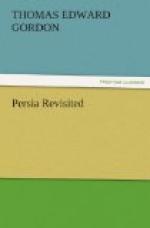The system of farming out the provinces gives rise to much grumbling, which perhaps, on close examination, may be found to be without full reason. The real cause of complaint is the absence of fair fixed taxation demands. Every village has to pay a tithe of its annual value to the State, and previous to collection the place is visited by one of the provincial officials, and the fullest details of the circumstances of each family are ascertained. The limit of the official robbery which follows is the ability to pay, as measured by the patience of the sufferers. The peasantry are peaceful, frugal, and easily governed, but there is a point beyond which they cannot be pressed without risk of making them turn on the oppressor. They have now learnt the strength of the defence they possess in the power of making their grievances known. No doubt the provincial levy of taxation charges doubles the State tithe, one-half of the whole amount being taken by the Governor and the officials; but all this does not mean more than one-fifth of the village income, for the general assessment was made before the existing improvement in the circumstances of the cultivators had taken place more or less all over the country. There was then little demand for products which are now exported and paid for in gold, thus giving a high price in the silver currency of the country. After the provincial taxation, there are local charges, which may possibly add a further 2 or 3 per cent, to the total amount. Formerly insecurity and want of confidence confined cultivation and stock-breeding to the barest limits, but it is evident now that the inhabitants can look to enjoy the fruits of their labour, and they are extending their fields of exertion. On the whole, it may be said that the peasantry and labouring classes in Persia are fairly well off, and I think their condition can bear a favourable comparison with that of the same classes in other countries.
In the course of my journeying in Persia, I generally found excellent quarters in the village houses. The rather mean outer appearance of the dwellings conveys the idea of poor accommodation within, but the reality is a pleasing disclosure of plain but well-carpeted rooms, with dados of matting or felt for the backs of the sitters by the wall. I always looked out for village lodgings when travelling off the main roads, and in wintry weather they were very comfortable from their open well-built clay fireplaces giving out heat without the nuisance of smoke. On these occasions I had ample opportunity to observe the every-day life of the people, and I was struck with much which showed that their manners and ways had been favourably touched and turned by a softening civilization of old date. I also there saw clear evidence of the origin of the Eastern shoe question, a matter which has often given rise to warm discussion in Persia and India; I allude to the removal of shoes on entering the inner rooms of a house. In India




